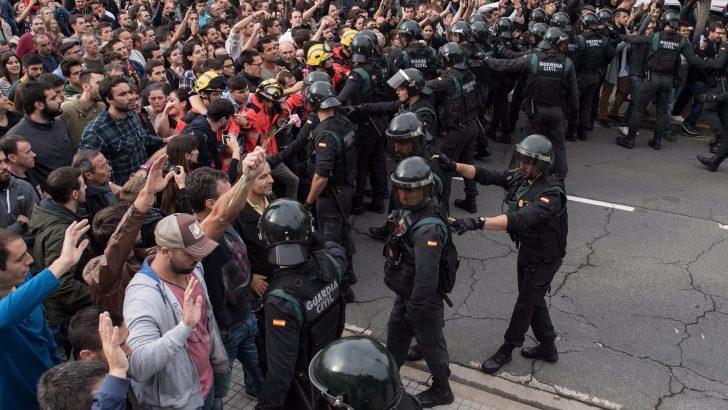Spanish bishops have dubbed the government’s use of violence to stop a disputed referendum “deplorable” after hundreds of people were injured by riot police.
More than 800 people were injured and many detained after the regional government of Spain’s Catalonia region attempted to hold an independence referendum. Catalan officials claimed that 90% of the votes cast were in favour of seceding from Spain, not counting the votes confiscated by police.
Cardinal Juan Jose Omella, archbishop of Barcelona, urged all parties to engage in “prayers and calm”.
“The violence experienced in Catalonia is deplorable,” he said. “We have to find a peaceful and democratic way out of this situation.”
The cardinal’s appeal came as Catalonia regional President Carles Puigdemont said in a televised address after polls closed that Catalans had “won the right to statehood”.
The vote went forward despite Spain’s Constitutional Court suspension of a law passed by the Catalonian parliament that said if more than 50 percent of voters in the referendum supported independence, the state would secede. The paramilitary Civil Guard used batons and rubber bullets in a bid to close polling stations and seize ballot boxes, triggering violence with protesters.
The president of the Tarraconense Episcopal Conference, which includes prelates from the Barcelona and Tarragona archdioceses, urged Catholics to “trust the God of peace”.
Catalonia, the wealthiest of Spain’s 17 autonomous regions, is home to 7.5 million people with its own language and culture, and separatist politicians promised the referendum after forming a coalition government in 2015.
Declaration
The vote was backed as conforming to “Gospel and humanistic values” by more than 400 Catholic clergy and religious order members, about 20 percent of Catalonia’s total, in a late September declaration. The message was sent to Pope Francis, leading to a formal protest by Spain’s ambassador to the Holy See, Gerardo Bugallo.
Cardinal Omella urged citizens to “abandon their egoisms and think more about others”.
Meanwhile, a group of Catholic public figures appealed for “the building of bridges not walls”, and said Catalonia should reject a cultural identity “defined in opposition to others”, recalling “disastrous periods of the past” when disputes were “resolved with violent force in civil wars”.
“We consider it aberrant that an aversion to everything Spanish has been forming in Catalonia over successive generations,” said the October 2 declaration, signed by Eudald Vendrell, president of Barcelona Archdiocese’s Justice and Peace Commission, and Teresa Compte of the Pontifical University of Salamanca.
“Hispanophobia stands in the same mire as anti-Semitism, racism, Islamophobia and class intolerance,” they said.


 Riot police clashed with voters in an attempt to stop voters partaking in Catalonia's disputed referendum. Photo: businessinsider.com
Riot police clashed with voters in an attempt to stop voters partaking in Catalonia's disputed referendum. Photo: businessinsider.com